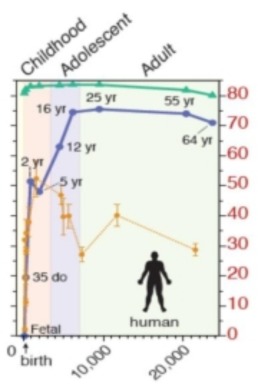Experience of parents with their children and teachers with their students demonstrate how kids change their behaviours and knowledge from childhood to adolescence. Until now, little was known of the causes that could lead to these changes.
Today, an article published in Science in collaboration with the group of Manel Esteller, Director of Epigenetics and Cancer Biology Biomedical Research Institute (IDIBELL), ICREA researcher and Professor of Genetics at the University of Barcelona, gives us an important clue to understanding this process.
Researchers have discovered that people’s frontal cortex (the part of the brain responsible for the conduct and the acquisition of new information) experiences a significant change from birth to the end of adolescence. The epigenome is transformed.
The study analyzes the epigenome of newborns, teenagers aged 16, and adults aged 25 and 50 in the United States and in Catalonia (Spain).
Epigenome
Epigenome is the set of chemical signals responsible for turning on or off genes in our DNA. The discovery published in Science shows that one of these epigenetic signals, methylation of genetic material, is progressively increased until the end of adolescence and entry into adulthood.
“The results of the study show that DNA methylation has a key role in shaping the communication spaces between neurons (synapses)”, explains Esteller. “The brain is divided into white matter (glial) and gray matter (neurons) with several cell types with different functions. DNA methylation patterns distinguish genes with cell-type specific activity. Even in the gray matter, there are cell subtypes such as pyramidal neurons and GABA neurotransmitter producers that have specific subpatterns of DNA methylation.”
“In addition, DNA methylation of neurons is different from the rest of the cells in our body. If normal is called 5-mCG, this, in the bran, is called 5-MCH: this is like putting an open or closed accent to a word, in this case a gene to change its meaning” explains Esteller.
This finding could have a profound importance in the knowledge of brain’s biology because besides explaining the plasticity of this organ when learning and living experiences, it could be decisive to understand the causes of altered behaviours and psychiatric diseases. Now, we must investigate whether minor alterations in the program of DNA methylation during early postnatal development could be associated to neurodevelopmental disorders such as autism or schizophrenia.
Article reference
Lister R, Mukame EA, Nery JR, Urich M, Puddifoot CA, Johnson N, Lucero J, Huang N, Zaman S, Schultz MD, Tonti-Filippini J, Yu M, Heyn H, Hu S, Wu JC, Rao A, Esteller M, He C, Haghighi FG, Sejnowski TJ, Behrens MM, Ecker JR. Dynamic epigenomic reconfiguration during mammalian brain development. Science, July 4th, 2013.

